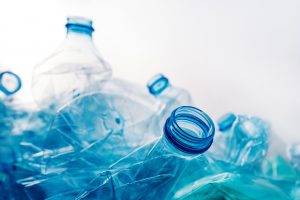
Global consumer brands unveil world’s first enzyme-recycled plastic bottles
Canadian Plastics
Packaging Recycling Research & DevelopmentA PET recycling breakthrough from Carbios, L’Oréal, Nestlé Waters, PepsiCo, and Suntory Beverage & Food Europe yields food-grade PET bottles.

Photo Credit: Bits and Splits/Adobe Stock
The possibility of endlessly recycled PET plastic – a recycling holy grail – is now one step closer, as French biochemistry company Carbios and global consumer food brands L’Oréal, Nestlé Waters, PepsiCo, and Suntory Beverage & Food Europe say they have successfully produced the world’s first food-grade PET plastic bottles produced entirely from enzymatically recycled plastic.
Each company has successfully manufactured sample bottles – based on Carbios’ enzymatic PET recycling technology – for some of their leading products including: Biotherm, Perrier, Pepsi Max and Orangina.
The announcement is the culmination of nearly 10 years’ research and development by Carbios to create a new process and supercharge an enzyme naturally occurring in compost heaps that normally breaks down leaf membranes of dead plants. By adapting this enzyme, Carbios has fine-tuned the technology and optimized this enzyme to break down any kind of PET plastic – regardless of colour or complexity – into its building blocks, which can then be turned back into like-new, virgin-quality plastic.
According to Carbios, its patented enzymatic PET recycling process enables a wide variety of PET plastics to be recycled into virgin quality, food grade rPET. PET plastics that would otherwise go to waste or be incinerated, can now be brought back into a continuous circular system of recycling. “And this can be achieved at high speed – breaking down 97 per cent of plastic in just 16 hours – 10,000 times more efficient than any biological plastic recycling trial to date,” it said.
Together, these brands will now work to scale this innovation to help meet the global demand for sustainable packaging solutions. In September 2021, Carbios will break ground on a demonstration plant, before launching a 40,000 tons capacity industrial facility, by 2025.
Enzymatic recycling overcomes the issue of degradation in conventional recycling and can be used on any type of PET plastic. Because [our] recycling process works under mild conditions, it could also lower the carbon footprint of PET waste treatment by saving 30 per cent of CO2 emissions compared to a conventional end of life mix of incineration and landfill, taking virgin PET production substitution into account,” Carbios said.
The successful completion of these initial food-grade bottles is a “major milestone” in the Consortium’s validation of Carbios’ technology, the company said. “This partnership is part of a growing trend amongst brands to collaborate across industries to tackle these global challenges, working towards a world of circularity, where we limit the production of virgin plastic,” it said.
Carbios will license its technology to PET manufacturers worldwide, which should accelerate the global adoption of enzymatic recycling for all kinds of PET based products.
